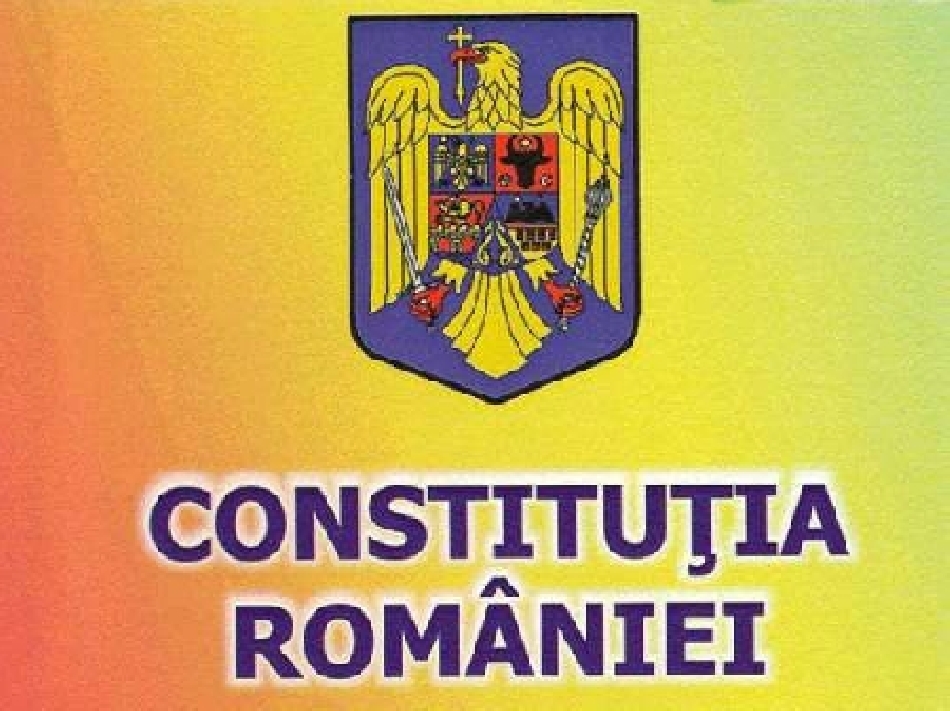What will Romania’s revised Constitution look like?
Todays edition provides on outlook on various proposals and plans to revise the Romanian Constitution.

Corina Cristea, 17.05.2013, 13:04
Romania’s current Constitution, which has been in force since 2003, is to be revised. Debates on this issue have been recently held all throughout the country. The Constitutional Forum is drawing up a report to include the civil society’s proposals as regards changes to be brought to the fundamental law. Public debates on the revision of the Constitution, which focused on three major directions — territorial, thematic and academic provisions — ended with meetings held in Bucharest and organized in cooperation with experts of the Venice Commission.
Among the main reasons that have prompted the fundamental law’s revision is the conflict among the state powers, so debates focused mostly on this issue. An opinion poll presented by the Constitutional Forum’s President, Cristian Parvulescu, reveals that more than half of Romanians believe that the attributions of the presidency, government and parliament should be revised, as well as relations between these three state powers. Following last year’s political crisis in Bucharest, which ended in a referendum on the impeachment of Romania’s president Traian Basescu, the Venice Commission made public a report, recommending changes and clarifications to this relation. No matter the changes to the fundamental law, there are two things that cannot be changed: the fact that Romania is a national state and a republic. Professor Cristian Parvulescu tells us more about it:
Cristian Parvulescu: “If we talk about revision, I don’t think that anyone can change Romania’s status as national state and its official language, which can’t be changed either. Nevertheless, there were proposals for a second national language at regional level, where minority communities are quite large. This issue will surely be approached within the Commission, because we have taken notice of this proposal and will include it the Forum’ report. The type of government the country has will also be discussed, but this is another constitution article that cannot be changed.“
Cristian Parvulescu also says that the articles in question cannot be changed by a simple constitution revision, but only by drawing up a new constitution. Romanian politicians must closely analyze all the changes they want to bring to the fundamental law, says Evgheny Tancev, former head of Bulgaria’s Constitutional Court, now a member of the Venice Commission, who has taken part in the debates in Bucharest. Romanian politicians, Tancev has pointed out, have to choose from among 4 types of republic: parliamentary, semi-presidential, presidential and semi-parliamentary.
Evgheny Tancev: “My feeling is that most opinions favor a parliamentary republic, but you cannot have that and at the same time choose the president directly. It is a question of balance among state powers.”
The political class has to choose from between a single and a two-chamber parliament. How the power is distributed among state institutions, depending on the type of parliament they choose, is highly important. As regards rights and liberties, representatives of the Venice Commission have suggested that the anti-discrimination spectrum should be widened to include age and sexual orientation.
According to Cristian Parvulescu, the less popular topic, when it comes to the Constitution’s revision, is regionalization. The political analyst has underlined that one of the recommendations made by the experts from Poland, where regionalization has proved a success, was that the Constitution should not include the number of the territorial-administrative units:
Cristian Parvulescu: “After 2006, the regions in Poland have been important engines for economic growth and they are highly successful, as we already know, at drawing European funds. The Polish don’t have counties and regions included in the Constitution, the have only communes and towns, leaving it to the Parliament to legislate the country’s administrative organization.”
Guaranteeing private property is another issue discussed at the Constitutional Forum, Prime Minister Victor Ponta underlining the need for clarifications in the Constitution that should allow for the confiscation, seizure and expropriation of property in certain conditions, thus eliminating abuse. Here is more on the topic from Alexandru Radu, an expert in constitutional issues and a teacher of political sciences:
Alexandru Radu: “The property issue has been controversial from the very beginning, since the original text of the Romanian Constitution was adopted in 1991. It was included in the Constitution only in 2003 following the then revision of the Constitution and now it will surely trigger debates. On the other hand I don’t think that the Prime Minister’s suggestion will cause very heated debates, given that the Social Liberal Union enjoys a comfortable majority in Parliament which enables them to counter any initiative of the opposition.”
The report drafted by the Constitutional Forum was forwarded to the parliamentary commission for the revision of the Constitution. In autumn, the Venice Commission will issue an opinion based on which Romanian authorities will consult Romanians in a referendum.






























